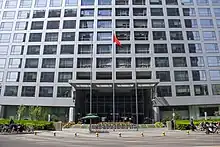| 中国证券监督管理委员会 | |
 | |
 Main entrance | |
| Agency overview | |
|---|---|
| Formed | 1992 |
| Jurisdiction | People's Republic of China |
| Headquarters | Beijing |
| Agency executive | |
| Parent agency | State Council |
| Website | www |
| China Securities Regulatory Commission | |||||||
|---|---|---|---|---|---|---|---|
| Simplified Chinese | 中国证券监督管理委员会 | ||||||
| Traditional Chinese | 中國証券監督管理委員會 | ||||||
| |||||||
| Alternative Chinese name | |||||||
| Simplified Chinese | 中国证监会 | ||||||
| Traditional Chinese | 中國証監會 | ||||||
| |||||||
The China Securities Regulatory Commission (CSRC) is a government agency directly under the State Council of the People's Republic of China.[1] It is the main regulator of the securities industry in China.
History
Indicative of the role of the CSRC, China's highest court, the Supreme People's Court–at least as of 2004–has declined to handle securities-related litigation directly, instead deferring such judgments to the CSRC.[2]
In November 2022, it stated its role to build "a capital market with Chinese characteristics".[3]
In 2023, the CSRC was upgraded to a government agency directly under the State Council. Additionally, it was granted responsibility auditing corporate bond issuances from the National Development and Reform Commission.[4]
Functions
China's first Securities Law was passed December 1998, and became effective July 1, 1999. The nation's first comprehensive securities legislation, it grants CSRC "authority to implement a centralized and unified regulation of the nationwide securities market in order to ensure their lawful operation".[5] The CSRC oversees China's nationwide centralized securities supervisory system, with the power to regulate and supervise securities issuers, as well as to investigate, and impose penalties for "illegal activities related to securities and futures".[6] The CSRC is empowered to issue opinions or "Guideline Opinions", which are not legally binding, as guidelines for publicly-traded corporations.[6]
See also
References
- ↑ Huang, C.W. (Winter 2008). "Company Law and the Independent Director System in Contemporary China". Hastings International and Comparative Law Review. 31. Retrieved 14 January 2019., p. 411.
- ↑ Yin, Dina J. (2004). "Investor Regulations: An American Answer to a Chinese Problem". Rutgers L. Rev. 57: 421. Retrieved 14 January 2019. pg. 421.
- ↑ "China Regulator's New Slogan Fuels Buying Spree in State Firms". Bloomberg News. November 24, 2022. Retrieved November 24, 2022.
- ↑ "Decoding Chinese Politics". Asia Society. Retrieved 2 October 2023.
- ↑ Friedman, William I. (2002). "One Country, Two Systems: The Inherent Conflict Between China's Communist Politics and Capitalist Securities Market". Brook. J. Int'l L. 27: 484–85. Retrieved 14 January 2019.
- 1 2 Huang, C.W. (Winter 2008). "Company Law and the Independent Director System in Contemporary China". Hastings International and Comparative Law Review. 31. Retrieved 14 January 2019., note 1.